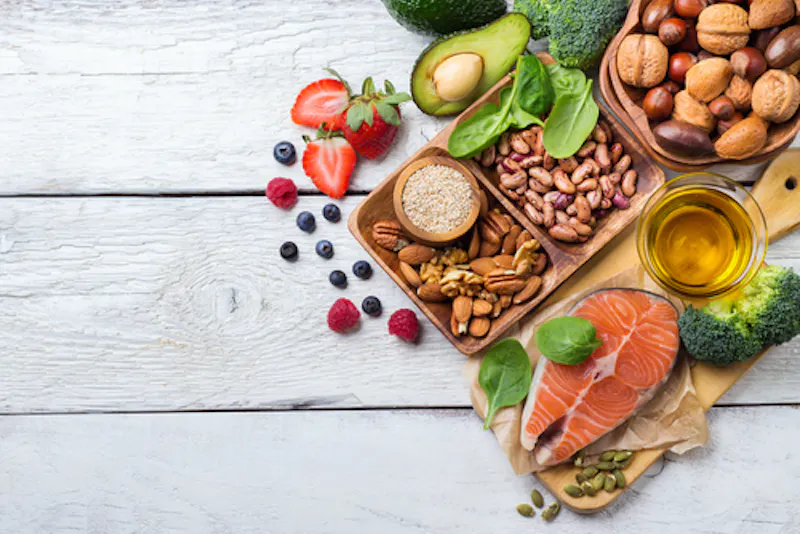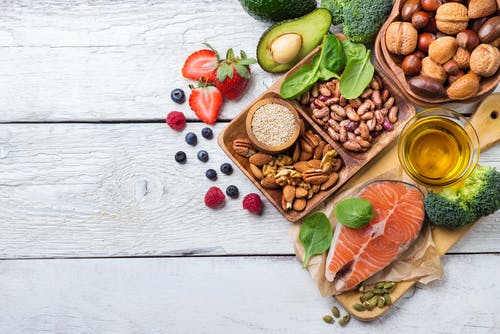Best foods to lower your cholesterol


Eating a balanced diet and getting regular exercise are some of the best ways to lower your cholesterol. And incorporating both into your daily habits can prevent it from getting high in the first place. A diet that supports low cholesterol levels includes everything from avocados to nuts and oats, to name just a few.
What are the best foods to lower cholesterol?
A wide range of foods can help to lower your cholesterol levels. At a high level, the types of food included in a Mediterranean diet are particularly beneficial for healthy cholesterol levels and reducing your risk of high blood pressure. This describes the traditional diet of countries that border the Mediterranean Sea.
While this diet varies by country, it’s typically high in fruit, vegetables, legumes (like chickpeas), beans, nuts, whole grains, and fish.
It’s also high in unsaturated fats, like olive oil and usually includes low amounts of meat, dairy, and alcohol.

Unsaturated fats to lower cholesterol
Replacing foods high in saturated fat with unsaturated fats can help decrease LDL cholesterol — the type that’s linked to an increased risk of heart disease.
It’s normal to have some saturated fat in your diet, but it’s a good idea to limit how much you have — because they can increase your LDL cholesterol. Foods high in saturated fat include fatty meat, butter, cream, and fried foods.
Another type of fat to limit is trans fats — this type is considered the most unhealthy. It raises your LDL cholesterol while also lowering your HDL cholesterol — the type that helps protect against heart disease. Trans fats are mainly found in highly processed foods like fried food, margarine, and cakes.
By focusing on including more unsaturated fats in your diet, it can naturally help to displace other types of fats in your diet. There are 2 types of unsaturated fats important for health:
- monounsaturated (omega-9) fats — lower your LDL cholesterol and maintain high levels of HDL cholesterol
undefined - polyunsaturated fats (omega-3 and 6 fats) — these are essential for your health and you can only get them from your diet
Find out more about the different types of cholesterol.
Fibre-rich foods to lower cholesterol
A diet high in fibre (30 g a day) is linked to a lower risk of heart disease. A particular type of fibre, soluble fibre, helps to ‘mop-up’ LDL cholesterol — lowering your levels.
One form of soluble fibre is very beneficial for lowering cholesterol — called beta-glucan. Evidence suggests 1 g a day of beta-glucan can lower LDL cholesterol.
Foods rich in soluble fibre include:
- oats — 1 bowl of porridge provides about 2 g beta-glucan
- barley — another rich source of beta-glucans
- kidney beans
- brussels sprouts
- peas
- potatoes
- apples
- citrus fruits
- strawberries
Soy to lower cholesterol
Research suggests replacing fatty meats with soy products can help prevent raised cholesterol levels. This is likely because it reduces your intake of saturated fats — as opposed to soy actually reducing your levels.
Opting for some meat-free days or meals can be a helpful way to reduce your meat intake.
Instead, try to opt for soy-based foods like:
- whole soybeans
- tofu
- miso
- tempeh
Plant sterols and stanols to lower cholesterol
Plant sterols and stanols are compounds found naturally in plants and are structurally very similar to cholesterol. The two compete for absorption, resulting in reduced absorption of cholesterol.
Plant stanols and sterols are naturally found in:
- beans
- lentils
- cereals
- vegetable oils
- seeds and nuts
Interestingly, they aren’t currently recommended by NICE guidelines for those with high cholesterol. This is likely due to the fact that there are no studies showing that they result in a lower heart disease risk. But the United States, Australia, and more do encourage the inclusion of plant sterols and stanols to help lower cholesterol levels.
How quickly can diet lower cholesterol?
How quickly your cholesterol levels drop will depend on a number of factors — like the number of dietary changes you make and how well you stick to them over time. But a small reduction can be seen in as little as 4 weeks. Most people can see a significant change within 3 months.
Keep in mind that research increasingly highlights the importance of overall diet quality, rather than individual foods. So focusing on your diet as a whole will have the most impact.
Find out more about the signs of high cholesterol.
How to check if your cholesterol levels have decreased
To measure the impact of the lifestyle changes you’ve made on your cholesterol levels, you need to do a cholesterol blood test — you can do this in the comfort of your own home, or you can arrange to visit a clinic where a nurse do it for you at an extra cost.
Aune, D., Keum, N., Giovannucci, E., Fadnes, L. T., Boffetta, P., Greenwood, D. C., ... & Norat, T. (2016). Whole grain consumption and risk of cardiovascular disease, cancer, and all cause and cause specific mortality: Systematic review and dose-response meta-analysis of prospective studies. BMJ, 353, i2716.
Cooper, A., & O’Flynn, N. (2008). Risk assessment and lipid modification for primary and secondary prevention of cardiovascular disease: summary of NICE guidance. Bmj, 336(7655), 1246-1248.
Duerden, M., O’Flynn, N., & Qureshi, N. (2015). Cardiovascular risk assessment and lipid modification: NICE guideline. British Journal of General Practice, 65(636), 378-380.
Shai, I., Schwarzfuchs, D., Henkin, Y., Shahar, D. R., Witkow, S., Greenberg, I., ... & Tangi-Rozental, O. (2008). Weight loss with a low-carbohydrate, Mediterranean, or low-fat diet. New England Journal of Medicine, 359(3), 229-241.